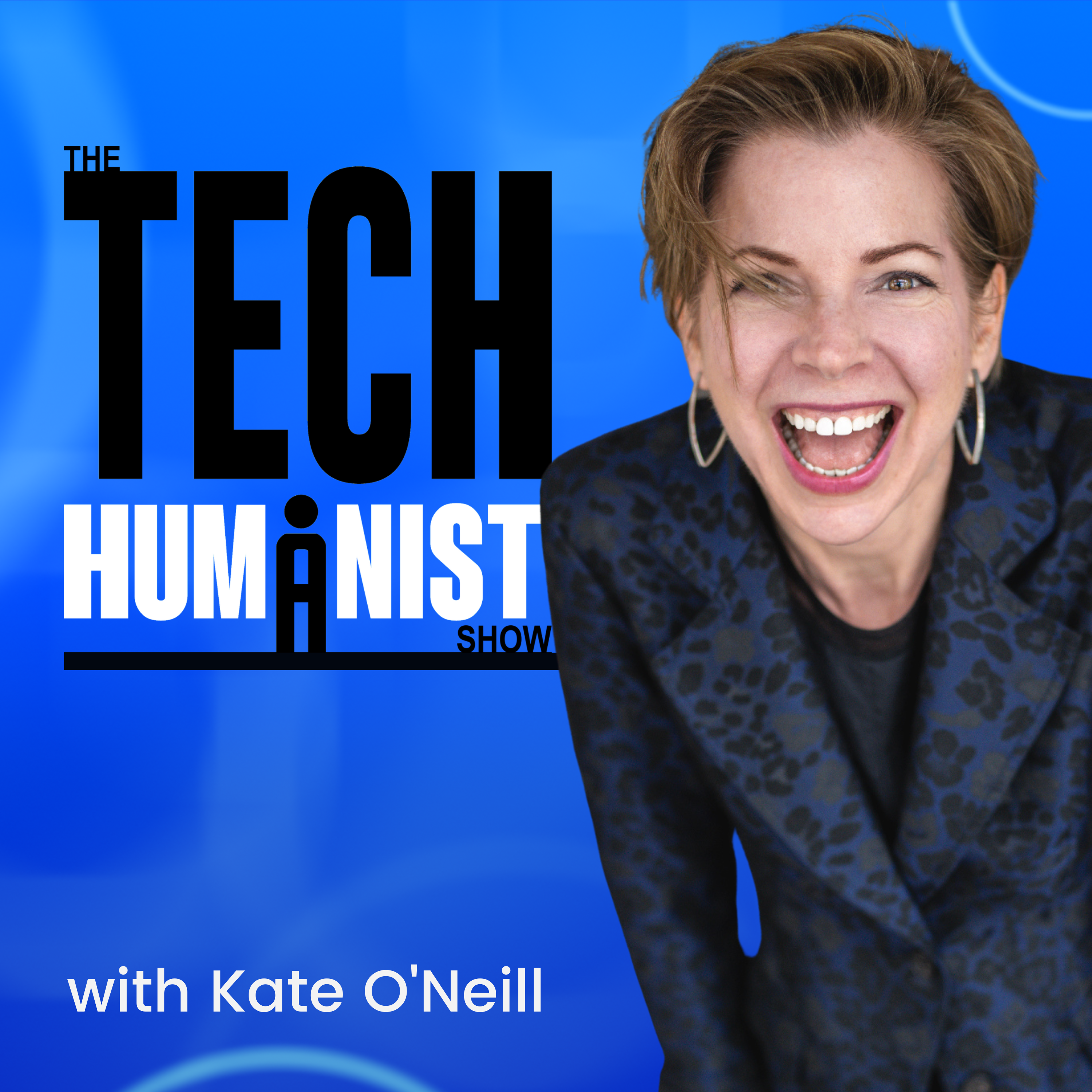Podcast: Play in new window | Download
Hello and welcome to The Tech Humanist Show! In this introductory episode, host Kate O’Neill explains what a tech humanist is and what you can expect from future episodes.
Guests on this episode includue Emma Bedor Hiland, Oluwakemi Olurinola, Dorothea Baur, Rumman Chowdhury, Chris Gilliard, and Rahaf Harfoush.
The Tech Humanist Show is a multi-media format program exploring how data and technology shape the human experience. Hosted by Kate O’Neill.
To watch full interviews with past and future guests, or for updates on what Kate O’Neill is doing next, subscribe to The Tech Humanist Show hosted by Kate O’Neill channel on YouTube.
Transcript
Hello humans, and welcome to The Tech Humanist Show! In this introductory episode, I’ll explain what a tech humanist is, and what you can expect from future episodes.
A Tech Humanist, as I’ve coined it, is a person who sees the exciting opportunities technology offers humanity, while remaining cautious & conscious of the potential risks and harms those technologies bring. It isn’t the same thing as a techno-utopian, who believes technology will inevitably bring about a utopia in the future, or a techno-solutionist, who believes technology is the solution to all our problems. Instead, a tech humanist believes that when we design technology, we have to think of humanity first and foremost, and remain active and diligent in making technology work better for all people. Here are a few clips from some of the experts I’ve spoken with for The Tech Humanist Show who sum it up well.
Emma Bedor Hiland: “I do actually identify as a tech humanist, because I am optimistic about what technologies can do, and offer, and provide and the ways they might be utilized to enhance human flourishing, especially in health spaces and including the mental healthcare space, too. I just think we also need to be realistic about what technology can do, and the ways that technologies are deployed which might cause us harm.”
Oluwakemi Olurinola: “I actually like the humanist put beside the tech. Since I advocate for empathy and social and emotional learning while we also train on the digital skills, I am a tech humanist.”
Dorothea Baur: “I’m proud to be a humanist! I believe that there is something distinctive about humans that we need to keep alive. One of the biggest achievements is that, like, 200 and, y’know, 40 years ago, when the Enlightenment set in, where we said, ‘hey, people, dare to use your own minds!’ it was like a wake-up call, because we didn’t really make an effort to explore the world because we thought everything was determined by God. By stepping out of this dependency and using our own brains, we liberated ourselves. And so now, are we taking it too far? Have we used our brains so far that we’re eventually training machines that are smarter than us and they’re kind of imposing their decisions again upon us, and not just imposing their decisions on us, but also imposing decisions that are equally as intransparent as god’s decisions, if you look at certain algorithms. We cannot delegate our responsibility to machines! We can use machines to improve our health, and our well-being, etc., to improve the world, but we cannot entirely delegate responsibility to machines.”
Right now, we’re seeing massive shifts in the way humans live and interact with technology, which makes tech humanism more important than ever. To maintain our agency, we need to work together to fight bias in our algorithms, make sure we think of the user experience and how technology affects us, and consider the role humans play in a world that is becoming increasingly automated.
Dr. Rumman Chowdhury: “I recognize and want a world in which people make decisions that I disagree with, but they are making those decisions fully informed, fully capable. Whether it’s being able to derive meaning from the systems we’ve created, or understanding what our meaning is, or what our purpose is as a human being, and not having that be shaped or guided by other forces.”
Dr. Chris Gilliard: “We really need to think about the effects of these things. Like, what are the potential harms of this thing? Before you put it out, right? When [REDACTED] came out and said, ‘we had no idea that people would use it to spread racism and misogyny!’ …they could have done that work, right? One of the things I’ve seen that does give me a little bit of hope is that there are more and more people not only saying that we have to do that work, but being inside these companies and actually holding them accountable for doing it.”
Rahaf Harfoush: “For me I think the reality is that everything that has the capacity to help us can also simultaneously hurt us in some new and different ways. I don’t necessarily think about what’s gonna help humanity, I think about, ‘what challenges are gonna emerge from this technology, and how can we navigate that?’.”
The first season of this podcast featured a number of interviews with some of today’s top thinkers, experts, and educators in the field of technology, with one guest interview per episode. From season 2 onward, every episode will instead focus on a key area of the intersection of technology and humanity, and the ways technology is changing and shaping the human experience. Each episode will feature multiple guests, featuring clips pulled from season one, as well as brand-new interviews that haven’t been and won’t be released on the podcast. Together, we’ll be tackling big ideas about how to make the future a brighter place for everyone.
The guests you heard in this episode were, respectively, Emma Bedor Hiland, Oluwakemi Olurinola, Dorothea Baur, Rumman Chowdry, Chris Gilliard, and Rahaf Harfoush. You can hear more from them and all my guests in past and future episodes of the podcast, or find full interviews at TheTechHumanist.com.
